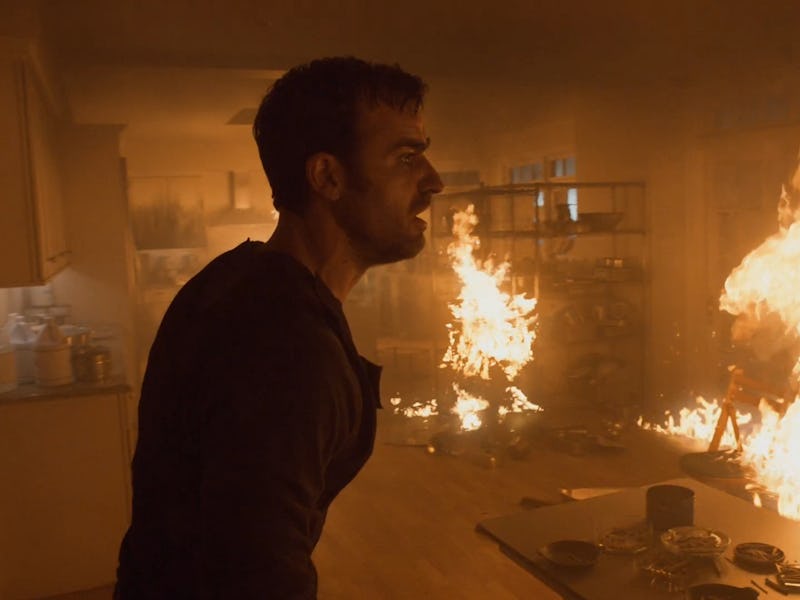Damon Lindelof’s Masterpiece Asked Us to Move On From the Apocalypse
Fall in love with all of life’s unexplainable mysteries.

One of our most persistent narrative fixations is the post-apocalypse, and the harrowing thought of what comes after the end. Not only does the concept let us explore the trajectory of our civilization, but it’s also the perfect way to stretch human behavior into a twisted, exaggerated caricature. This year alone, we’ve already had the long-awaited Fallout adaptation and the mythic Mad Max prequel Furiosa, both works in which the human psyche is as broken and fractured as the scorched Earth around it.
While we’re used to wastelands corrupted by nuclear annihilation and populated by leather-clad pro-wrestling heels, Damon Lindelof and Tom Perrotta introduced us to a vision of the End Times far more grounded and intimate, but arguably just as chaotic. The Leftovers, which began 10 years ago, was confounding, darkly funny, and often anti-climatic, but also devastatingly human in its cosmic blindness. From the pilot onwards, the show established itself as thoughtful prestige television in a decade marked by increasingly tumultuous cultural shifts, and years after its conclusion it remains achingly relevant.
In The Leftovers, society begins to topple not with a thunderous conflict but an inexplicable whimper. The Sudden Departure, in which 2% of the world’s population suddenly vanished three years before the show begins, has fundamentally changed life on Earth, but despite a complete lack of answers from the scientific community, bureaucratic institutions around the globe just keep spinning. There’s an insistence behind returning to the “status quo” that feels so distinctly post-COVID in retrospect, the rallying cry of a society reeling from a tragedy so indescribable that it’s easier to pretend it didn’t happen.
That sort of pitch-black irony is all over the show, and it's the driving force behind the battle for the soul of Mapleton, New York, where Season 1 takes place. No one quite knows how to grieve — not police chief Kevin Garvey (Justin Theroux) nor the community at large, which is eager to appear as though they’ve moved on despite the psychological scars. And as world religions fall due to their inability to provide answers, we watch a new movement take root: the white-clad, chain-smoking Guilty Remnant, who take vows of silence to protest the absurdity of denying the drastic change that’s occurred.
The Guilty Remnant are odd, but you can empathize with them.
Determined to upset the natural order through acts of nonviolent social disruption, the Guilty Remnant are guided by an ideology that feels more relatable with each growing year. We watch as mass shootings and international conflict are defanged until it’s too easy to grow complacent and unbothered by their existence. It can be infuriating to watch society deny the tragedy we’re all exposed to on a regular basis, and The Leftovers illustrates how easy it is to become thoroughly radicalized by casual indifference.
Of course, everyone has their own ways of coping with trauma, some healthy than others. In a pulpier, more over-the-top story, Kevin Garvey would be the stoic, broken antihero, surviving through spite and sheer willpower. But here he’s a toxic, self-destructive image of masculinity woefully under-equipped to handle emotional turmoil, lashing out at the world and victimizing those around him. The rest of his family doesn’t fare much better. His ex-wife Laurie (Amy Brenneman) joins the Guilty Remnant in search of purpose, while his daughter Jill (one of Margaret Qualley’s breakout roles) drowns her existential frustrations in teenage drinking and fresh vices.
Not even a global catastrophe can excuse Kevin Garvey’s issues.
Local celebrity Nora Durst (Carrie Coon), who lost her husband and both children in the Departure, copes by playing the role of sad victim, while her brother, Reverend Matt Jamison (Christopher Eccleston), tries to validate his faith by identifying which of the Departed were sinners. In The Leftovers, those forced to shoulder the burden of survivor’s guilt seem to enjoy the pity and acknowledgment that comes with it, but the concepts of vulnerability and emotional honesty are far less appealing.
Repurposing the mystery box ethos that guided Lindelof and J.J. Abrams through Lost, Lindelof and the show’s writers don’t simply use it for narrative intrigue, but existential truth. There’s a frustration to the lack of answers, but that frustration is familiar to anyone who’s experienced the universe’s sardonic sense of humor, and that impenetrable unknowability is perhaps the most unifying element of the human experience. To be alive is to be wholly ignorant of, and insignificant to, the puzzling design of it all, but does that make it any less worth it? The Leftovers remains one of the greatest TV shows of all time, not because it pretended to have all the answers, but because it knew that the most authentic approach would be to not have any of them.